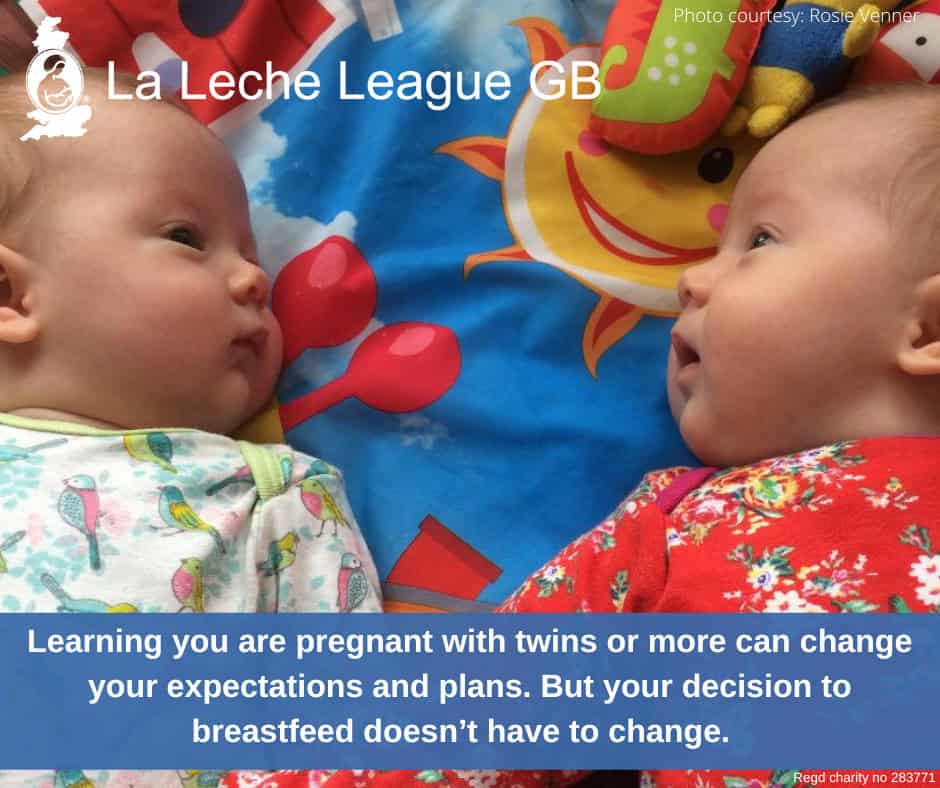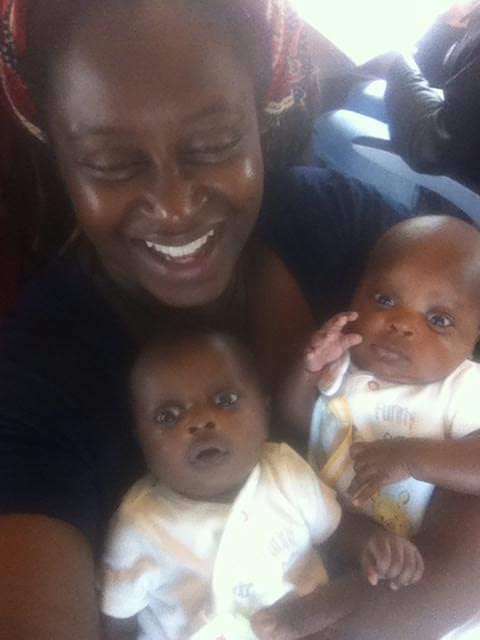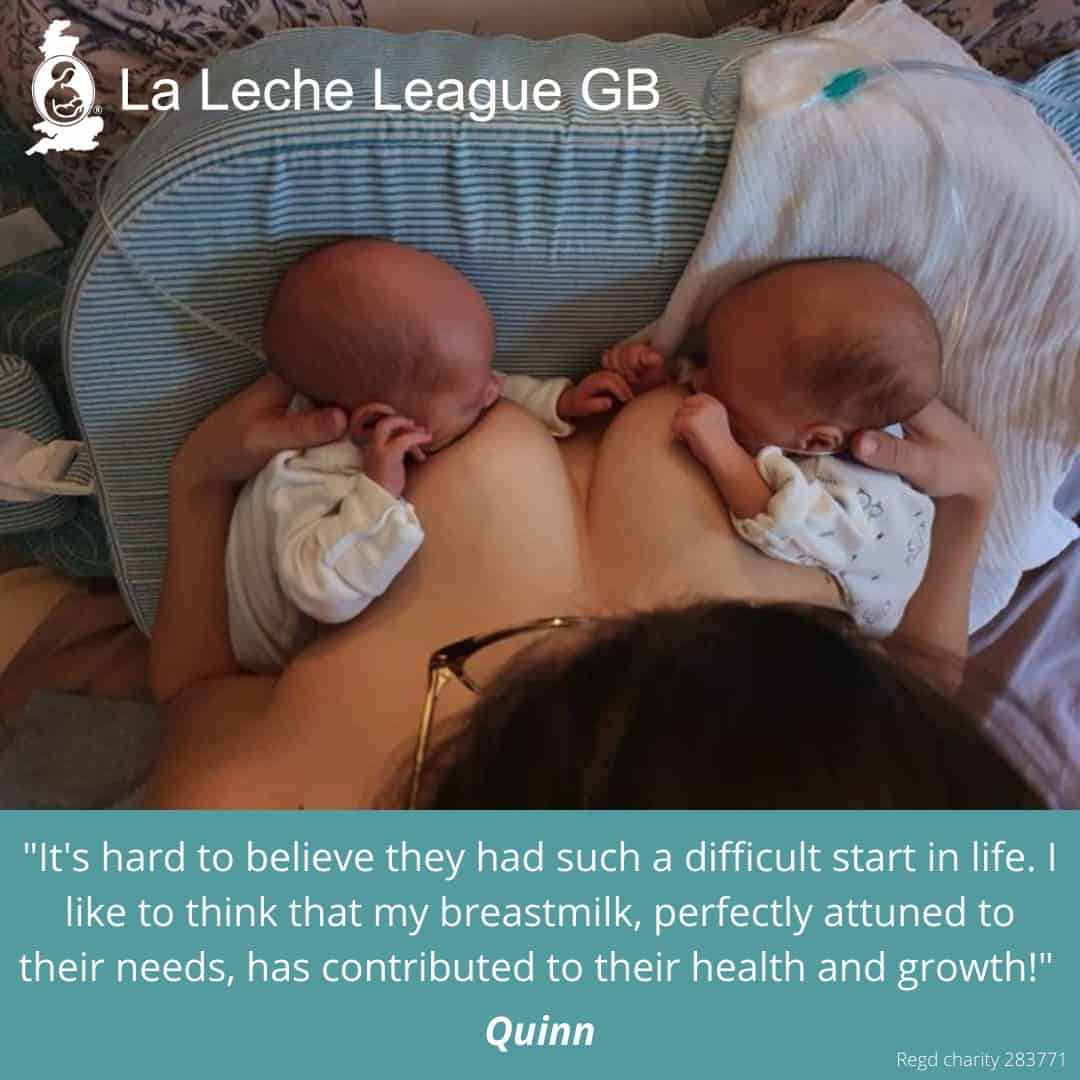Learning you are pregnant with twins, triplets or more changes your expectations and plans. But you can still plan to breastfeed.
Breastmilk is a complete and perfect food for your baby. It is especially important for multiples, who are often small at birth. Breastfeeding also helps you create a special bond with each of your babies. Many mothers have nursed their multiples; you can enjoy nurturing your babies this way, too.
Planning ahead
Limit visitors
Making enough milk
Co-ordinating feeds
Separation
Night feeds
Looking after yourself
Other sources of practical help
Mixed feelings
Practicalities of getting out
Finding support
Planning ahead
If possible, attend La Leche League meetings or our Antenatal Breastfeeding classes in pregnancy to learn about breastfeeding and meet breastfeeding mothers. Do read The Womanly Art of Breastfeeding, Mothering Multiples by Karen Gromada and our page on Birth and Breastfeeding.
Even with good care, you might experience complications during pregnancy so it helps to be prepared. Ask your midwife for information on warning signs for premature labour. Seek medical attention quickly if any occur, or you have any of these symptoms: a severe headache or stomach ache, see spots in front of your eyes, or feel extremely irritable or tense.
Limit visitors
Limit visitors in the early days while you are gaining confidence breastfeeding. Tell friends and family you need time to recover and suggest they visit later, or drop round a meal! You may want to practice feeding two babies together before doing it in front of other people.
Making enough milk
The more milk your babies take, the more your breasts will make. This is especially important in the first few weeks. Since mothers of multiples usually experience more breast development during pregnancy, mothers of mulitples can usually produce enough milk for two or even three babies.
See Is My Baby Getting Enough Milk?
Encourage each baby to feed at least 8–10 times in 24 hours. If one of your babies is too sleepy to rouse himself every few hours, you will need to wake them to feed to ensure they get enough milk. See our page Sleepy Baby—why and what to do.
At first you may feel you are doing nothing but feeding, but things will settle down as your babies grow and your milk production adjusts. Practical help with everything else will allow you to sit or lie down and concentrate on the important job of establishing breastfeeding.
Co-ordinating feeds
Once breastfeeding is established, you may find nursing two at once is easiest and saves time. But remember each baby is different and one baby may need more feeding than the other. Laid back breastfeeding positions can leave your hands free to help each baby latch on well. Nursing pillows designed for twins are also available. Feeding two babies at the same time may help if one of your babies is less efficient at nursing, as let-down will occur more easily.
Separation
You can still breastfeed, even if you can’t be with your babies straight away. Hold, or at least touch, your babies immediately after the birth or as soon as you can. You can still touch and stroke a baby in special care and may be able to hold him against you in ‘kangaroo mother care’. If he can’t breastfeed, express your milk for him. This is the most important thing you can do whilst you are waiting to start breastfeeding. When you are back together, spend as much time as possible snuggling together skin-to-skin to establish breastfeeding.
If you need to express your milk because one or both babies can’t nurse, hand expression is useful in the first few days. Plan to express from both breasts at least eight times in 24 hours, about every two to three hours during the day and at least once during the night. As your milk increases, you can switch to a hospital grade automatic electric pump. For more expressing, see our article here.
After separation, many mothers experience shock, sadness, mourning for missed bonding opportunities, worry for babies who are ill, fear and a lack of control. It can be difficult to put into works what you are feeling, but it can have a bit impact on you. Bliss offers free counselling services for parents of premature or sick babies, or you GP can refer you.
Night feeds
Breastfeeding at night lying down gives you more rest. It gets easier as your babies grow. In the meantime, use enough pillows to recline in bed and feed two babies at once. Keep a drink and snack handy plus books or music to pass the time. See Safer Sleep and the Breastfed Baby.
Looking after yourself
- You’ll be busy looking after your babies but don’t forget to look after yourself too. Try to eat a balanced diet and drink enough. Get as much rest as possible, and sleep whenever your babies sleep.
- Looking after your babies will be a full-time job for quite a while so expect to do only the absolute minimum of other tasks.
- Accept offers of help with housework or olders children if it feels right. Sometimes helpers wait to be asked so having a list of specific tasks ready can make it easier. You could also share our leaflet or link to Supporting a Breastfeeding Mother.
- Your partner or support person will have a crucial role both practically and emotionally. Other family members and your support network may also enjoy the chance to be practically involved and make quickly develop close relationships with your babies.
- Take moments to appreciate this special time and be proud that you can nourish and nurture two or more little human beings at once!
Other sources of practical help
- Midwives, health visitors, clinics and surgeries.
- Homestart – a charity which offers support and friendship to families who are struggling to cope for a variety of reasons.
Mixed feelings
Mothers of twins or more often have mixed emotions about being a mother to multiples. It’s normal to feel ‘touched out’, overwhelmed and exhausted when caring for two or more babies at once. It can really help to talk to another mother in the same situation. Your local LLL Leader can put you in touch with other mothers who have breastfed multiples. Consider joining the ‘Breastfeeding Twins and Triplets’ Facebook group. There may also be a local twins support group near you (see Further Information section). Adjusting to Motherhood has practical tips on dealing with feelings too.
Practicalities of getting out
It’s daunting leaving the house with more than one baby. Start by going out briefly with someone else to help.
- Keep a changing bag packed and ready. A backpack leaves your hands free.
- Keep valuables and keys safe to hand in a waist pack or small bag across your chest.
- Slings designed for twins are available. Consider using a sling or carrier for one baby even when out with a pushchair. A double pushchair can be useful for carrying shopping too.
- Alternate which baby gets carried: it’s easy to overlook a quieter baby’s need for closeness if one fusses more when out and about.
- Think about suitable places for feeding ahead of time. Look out for your babies’ early feeding cues so you can offer a feed before they start to fuss and attract attention from others. You may prefer to feed one baby at a time while out and feed two together at home. Or you may quickly get to grips with feeding two babies together while out. It’s a great way to quieten two hungry babies and quickly meet their needs.
Get to know your babies
With time, you will come to know your babies as individuals. Take opportunities to give them a little undivided attention: feeding, nappy changes etc. A few minutes here and there all add up. Their different personalities will soon show through.
Finding support
It can take a while for breastfeeding to become easy, or for your babies to learn to breastfeed effectively. If you need to seek out breastfeeding support as soon as you encounter a problem – don’t wait. You can get skilled help from an LLL Leader and support and encouragement from your local LLL group.
Further Reading
Adjusting to Motherhood
Antenatal Expression of Colostrum
Birth and Breastfeeding
Caesarean Birth and Breastfeeding
Hand Expression of Breastmilk
My Baby Needs More Milk
Sleepy Baby – Why and What to Do
Supporting A Breastfeeding Mother
Mothering through special care
LLLI Resources
Breastfeeding Premature Babies
When there are two – breastfeeding twins
Other websites
Information on nursing multiples by the author of Mothering Multiples.
Breastfeeding Twins and Triplets by Kathryn Stagg, IBCLC
Books
The Womanly Art Of Breastfeeding. LLLI, London: Pinter & Martin, 2010.
Hold your Prem. Jill Bergman and Dr Nils Bergman. Cape Town: New Voices Publishing, 2010.
Mothering Multiples. Karen Kerkhoff Gromada. Schaumburg, IL: LLLI, 2007.
Breastfeeding Your Premature Baby. Gwen Gotsch. LLLI, 2002.
Further Information
Twins Trust provides information and support networks for families of twins or more. Tel: 0800 138 0509 (10 am–1 pm and 7pm–10pm, daily).
Breastfeeding Twins and Triplets UK is a charity providing breastfeeding information and support run by breastfeeding counsellors
This information is available to buy in printed form from our Shop.
Copyright LLLGB 2020
Updated June 2022





